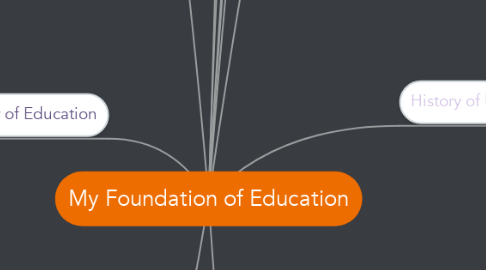My Foundation of Education
von Carrrie Holmes


1. Philosophy of Education
1.1. Realist- Only through of the material world is it possible for an individual to clarify or develop ideas.
1.2. Aristole- (384-322 B.C.), a student of Plato's was the son of a physicain. Realist idea.
1.3. Teachers according to contemporary realist should be steeped in the basic academic disciplines in order to transmit to their students the knowledge necessary for continuation of the human race. They should have a solid grounding in science, mathematics, and humanities.
1.4. Goal of Education- It is possible to understand ideas through studying the world of matter, the real world was the starting point in the quest fir understanding philosophical concerns.
1.5. Realist would support a number of methods, like lecture, and question and answer. Additionally, since they believe in objective criteria for judging the value of artistic and literary works, they would support the lecture as a method of instruction in order to give students the knowledge necessary to make these evaluations. Many realist support competency based assessment as a way of ensuring that students learn what they are being taught.
1.6. Curriculum for the realist would consist of the basics: Science and math, reading and writing, and humanities.
2. Schools as Organizers
2.1. The Complex Roles of the Teacher: An Ecological Perspective (1984)
2.2. Different roles that teacher must play: Colleague, friend, nurturer of the learner, facilitator of learning, researcher, program developer, administrator, decision maker, professional leader, community activist are to name a few.
2.3. "Teaching is profession that teaches all other professions"
2.4. National Politics and Educational Inequality: Opportunities should be linked to performance, not social status, family background, or other nonacademic aspects of the student.
2.5. Civil Rights Movement 1960s: Enforcement of students Civil rights.
2.6. Expansion of the role of Federal government in education best symbolized by founding the United states Department Of Education 1970s.
3. Equality of Opportunity
3.1. Elementary Secondary Education Act
3.2. Coleman Study 1966: A study to determine relationship between organizational characteristics of a school and student achievement.
3.3. the fact that race is related to educational outcomes given the statics is undeniable but given the nature of the U.S society, it is extremely difficult to separate race from class.
3.4. Students socioeconomic status can effect their education due to several factors: education can be expensive, the longer a student stays in the the more chances are they will need financial assistance.
3.5. 1988 Achievement gaps have widen between African-American students and whites or Hispanic students.
4. Educational Reform
4.1. Passow: The need to attain the twi goals of excellence and equity.
4.2. Goals 2000:increasing high school graduates requirements, instituting statewide testing programs, offering more Advanced Placement courses, promoting the use of technology, instituting new teacher evaluation programs.
4.3. Neo-liberal approach to urban school reform: stresses independent power of schools in eliminating the achievement gap for low-income students.
4.4. EEP: seeks to eliminate the achievement gap by working to create an effective school for every child.
4.5. https://en.wikipedia.org/wiki/Education_reform
4.6. http://www.ed.gov/p-12-reform
5. My Perspective is Conservative
6. Politics is the art of looking for trouble, finding it everywhere, diagnosing it incorrectly and applying the wrong remedies. Read more at http://www.brainyquote.com/quotes/quotes/g/grouchomar146422.html#YOxlkaEY5tvwUHHC.99
6.1. Who is involved in the decision making?
7. Politics of Education
7.1. My vision of education is Progressive
7.1.1. “Think about every problem, every challenge, we face. The solution to each starts with education.” George H.W. Bush
7.2. http://www.search4clarity.com/education/perspective/conservative
7.3. http://www.theatlantic.com/national/archive/2012/04/politics-and-education-dont-mix/256303/
7.4. http://oregonstate.edu/instruct/ed416/PP3.html
7.5. http://blogs.edweek.org/edweek/Bridging-Differences/2014/04/school_is_conservative_educati.html
7.5.1. Bridging the difference
8. History of U.S. Education
8.1. Education for Woman and African Americans to me as a woman is one of the most important times in history hands down, where would I be today if I were not allowed to be educated?
8.2. “A feminist is anyone who recognizes the equality and full humanity of women and men.”
8.3. Traditionally the role of a woman in Western society has been that of helpmate or homemaker (which is still very important today) to the male, who assumed the role of provider.
8.4. In 1812, Emma Hart Willard opened the Troy Female Seminary in Troy, New York.
8.5. Democratic-Liberal (equal opportunity for all)
8.6. Conservative interpretations (Progressive education without sacrificing academic quality).
9. Sociological Perspectives
9.1. "Positive attitude is the key to accomplishing what others feel is impossible to accomplish".
9.2. Knowledge and Attitude make a difference: Ron Edmonds research demonstrated that academically oriented schools produce higher rates of learning. Also, schools were students are compelled to take academic subjects and where there is consistent discipline, student achievement levels go up.
9.3. Functional theorist: Examine how well different parts are integrated together. Functionalist view society as a machine, where one part articulates with another to produce the dynamic energy required to make society work.
9.4. Employment and education is huge!! Research has shown that large organizations, such as corporations, require high levels of education for white collar, managerial, or administrative jobs.
9.5. http://www.spotlightonpoverty.org/education_and_poverty.aspx
9.6. https://www.dosomething.org/facts/11-facts-about-education-and-poverty-america
10. Curriculum and Pedagogy
10.1. State Senators
10.1.1. Richard Shelby: Senior Senator Took Office: Jan 6, 1987 Next Election: 2016 Party: Republican
10.1.2. Jefferson Sessions:Junior Senator Took Office: Jan 7, 1997 Next Election: 2020 Party: Republican
10.2. House Of Representatives
10.2.1. District 6: Gary Palmer Took Office: Jan 6, 2015 Party: Republican
